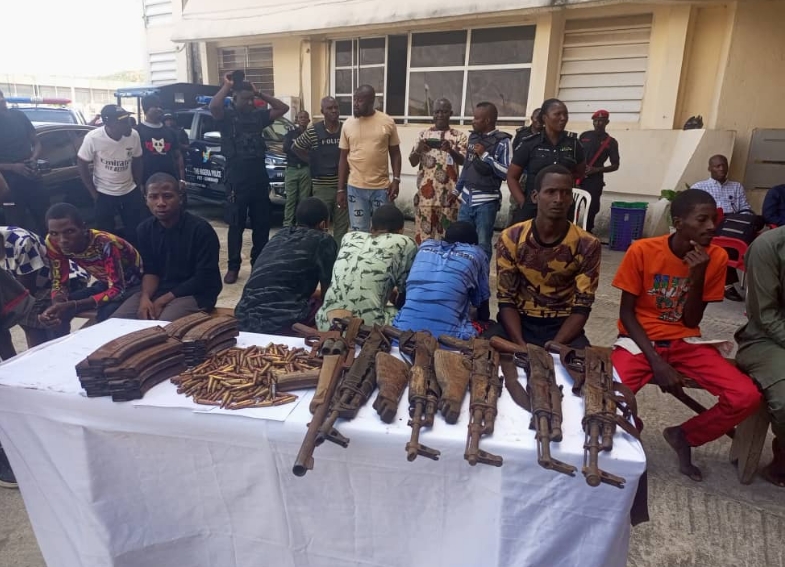Olayomi Koiki

ABUJA – A suspected kidnapper arrested by Nigeria Police Force; Federal Capital Territory (FCT) Command, has revealed what he used his share of ransom money to do.
Abdulrahman Adamu admitted that he used his share of ransom money from kidnapped victims to drink and womanize.
The bandit is among eight suspects paraded on Monday by the FCT Commissioner of Police, Tunji Disu.
Disu listed the suspects as Abdulrahman Giwa, Baba Hassan, Mohammed Dahiru, Abubakar Bature alias Dayi, Abubakar Kadiri alias Dare, Kabiru Ibrahim, Ya’u Adamu and Hussani Ori, also known as Mugu.
The police boss stated that the suspects terrorized communities in the FCT, Kaduna, and Niger states, adding that their leader, identified only as Mallam, along with eight others, was killed during a shootout.
“All suspects are members of a kidnapping/banditry gang led by one Mallam (surname unknown), now deceased. During operations targeting the strongholds of the kidnappers in the Kweri and Gauraka Forests, Mallam and eight other suspects were neutralized after an intense exchange of gunfire. Unfortunately, two operatives of the FCT Command sustained serious injuries and are currently receiving treatment in the hospital,” he said.
Disu also disclosed that intelligence gathered indicated that the gang held their hostages in various locations, including Gidan Dogo Forest in Kaduna, Gauraka Forest in Niger, and Kweri and Kachia forests in Kaduna.
The police reportedly recovered several exhibits from the gang, including three AK-47 rifles, 100 rounds of live 7.62 ammunition, and 10 AK-47 magazines.
Disu said efforts to arrest the remaining gang members and recover more arms and ammunition were ongoing.
However, in an interview with reporters, the suspected bandit Adamu confessed to making a lot of money from kidnapping activities, including ₦600,000 in the last operation before his arrest.
“I joined through one of my friends. He is dead now. What we do is to kidnap people for money. The people I was accused of killing were based on the instructions of my boss. My boss is dead now. I have made a lot of money kidnapping people. In the last operation before we were caught I made over ₦600,000,“ he said.
When asked what he used the money for, he said, “I used my money to drink and carry women. I used it to womanize and drink.”
– Insecurity and violence in Nigeria –
For more than a decade, civilians in Nigeria have faced multiple security threats and risk of atrocities as result of attacks, kidnappings and extortion by various non-state armed groups.
Since the start of 2024 civilians have faced intensified violence across Nigeria, and near-daily attacks by armed groups resulting in kidnappings and other abuses against civilians.
Armed groups and gangs, including so-called “bandits,” have – for many years – perpetrated widespread atrocities, including murder, rape, kidnapping, organized cattle-rustling and plunder. Armed herdsmen are also destroying vast swaths of farmland, prompting many farmers to abandon their land out of fear of attack.
In August, the Director General of the World Trade Organisation (WTO), Ngozi Okonjo-Iweala, said insecurity in Nigeria is weaponised by politicians for political and selfish reasons.
A Nigerian soldier, Suleiman S., also alleged that the government’s practice of paying ransoms to terrorists – dubbed as bandits in the country was hindering the military’s ability to effectively combat them.He urged the public to redirect their blame from the Nigerian Army to the government, emphasising that soldiers are constrained by orders and cannot take independent action.
The soldier said the military has the capability to eradicate bandits, particularly in hotspots like Zamfara State forest within a week if given the necessary orders.
He expressed frustration that the military’s potential is being wasted due to a lack of direction from leadership, whom he accused of profiting from the ongoing crisis.
Nigerian authorities are not going to arrest Boko Haram terrorists, bandits, and other criminals because they were created for political purposes, human rights activist Omoyele Sowore had alleged in September.
Speaking when he appeared on Voice of The People FM, Sowore alleged that government officials have links with the criminals, using them to gain power and later protecting them.
